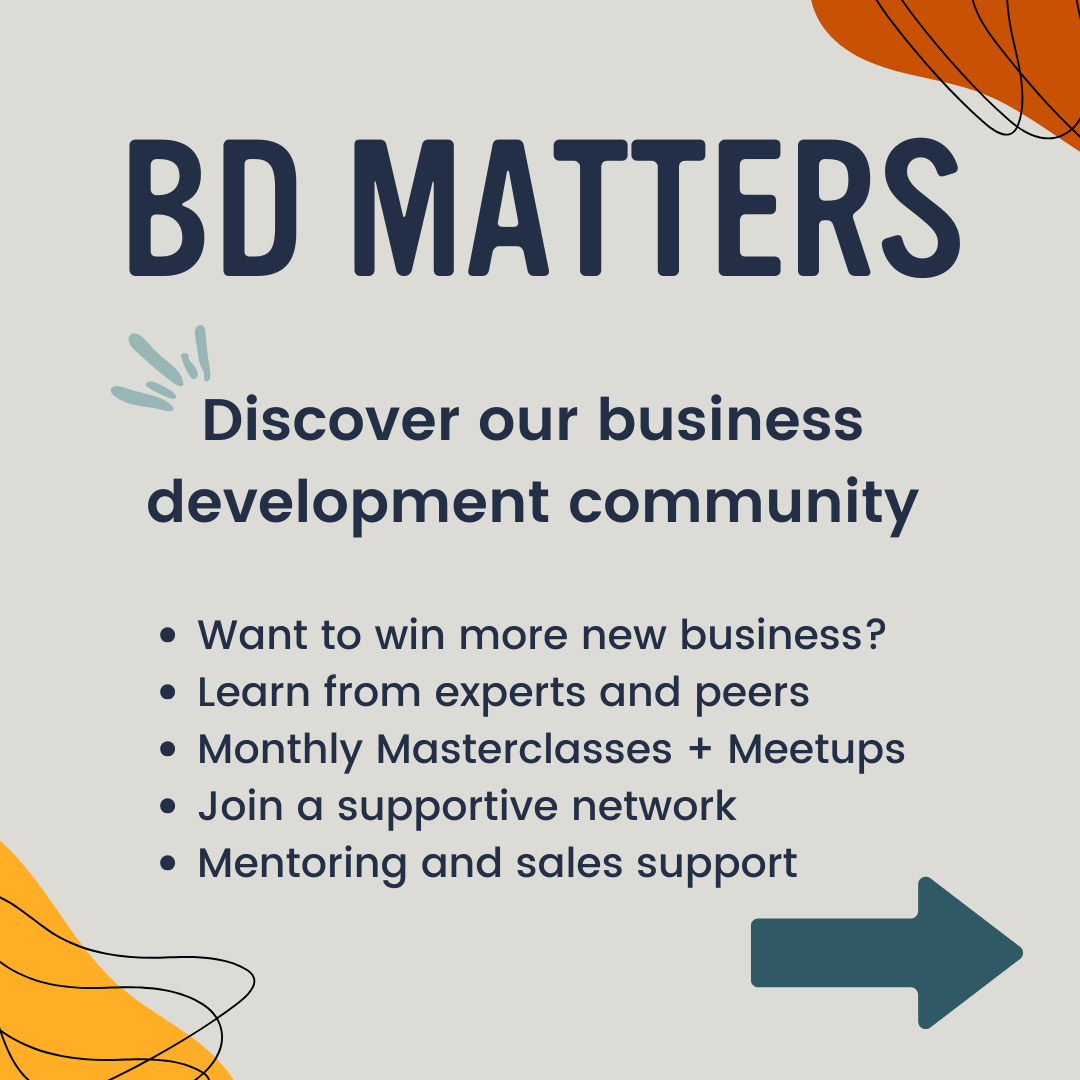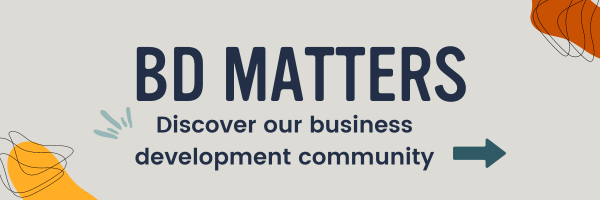
Selling isn’t dirty, it’s human
April 11, 2022
Demystifying ‘BD Roles’
It’s been 15 years since my first cold call. A new business strategy in 2008 was a list of contacts you rang around trying to book a meeting, getting told to “f*ck off” 80 times a day. Sadly, some people still call this a new business strategy. But thankfully I’ve learnt a lot since those days and witnessed a huge shift in the BD landscape.
What’s changed?
The first shift some have been able to make is the shift from ‘Chase to Attract’ incorporating marketing tactics, inbound marketing, ABM and a general understanding of why you need to lead with a value proposition to a specific audience. But again, you’ll be amazed how quickly it is for people to slip back into old habits, especially when the chips are down.
For sales people like me, the pandemic has moved us into a new era of technology. Whereas before, having a CRM was a basic necessity, now many are establishing more sophisticated automated processes to help generate, identify and close leads.
But the understanding of BD roles is an even greater minefield. Business owners don’t know what they actually need from us! They can’t identify their weaknesses and they assume all new business people can do everything, but there is an ever growing list of specialisms. So it’s a bit like trying to solve a rubix cube with 20 different instruction guides. Sounds stressful right? Well, think how us BD people feel. Ultimately its a recipe for disaster for both business owner and sales person.
BD encompassing sales and marketing
In a post-Covid world, people were forced to wisen up to the idea that making 100 outbound calls per day is redundant. Targeted calling to marketing qualified leads, however, is still something we advocate.
Traditionally business development is about creating new opportunities. Yet there has been a recent shift to include marketing and PR functions to the role to help attract, educate and nurture prospects. That’s why I like the term ‘BD’ as to me it encompasses the cold face of sales, through to marketing, nurturing and closing.
The multifaceted functions of business development has increased appreciation for the role but confused the hell out of business owners, who’s previous brief was “I just need a good new business person, someone who can generate leads”. Well that doesn’t really paint the full picture of an incredibly complex sales process.
We have to accept that today’s buyers have far more information than sellers; with all the information no more than a click away. So the job of a BD person can’t be pushy towards their offering, their role is more to guide prospects to help them better understand their problem and the solutions available.
Often businesses treat sales and marketing as if they are different things and I think there’s a real danger in that and also a missed opportunity. Together they can target prospects at multiple points of their journey, you can double-down on messaging to get more traction, it will help focus and organise BD efforts and when done right, marketing should be highlighting key leads for sales people to focus on converting. Many campaigns fail because of the lack of nurturing.
Technology is becoming more prevalent
Across various industries, technology post-Covid has transformed the way people work.
“In BD for example remote working policies accounted for 50% of video conferencing. Zoom shares soared 400% in 2020 alone. Conversational AI and virtual assistants are estimated to be worth £5.6 billion.
65% of organisations reported automation has increased success in attracting and retaining customers.”
You probably bang on to your clients all the time about how important data is, but when you take a look at your own, do you just see a few measly spreadsheets or a poorly managed CRM system?
As you know there are millions of little software tools and widgets on the market, and our job is to make use of them so we can power your new business machine with data. This is one of the keys to sustainable business growth.
Whether it’s email or LinkedIn automation, Zoom webinars, lead scoring, dynamic messaging based on personas or customised landing pages; technology is everywhere and if you are to remain competitive, unavoidable.
We don’t learn from other industry sectors
Throughout my career I obviously learnt some incredibly valuable skills but having left the big agency world, I quickly noticed we’d been slightly closed off from the ‘real world of B2B’ and how sales is done in other industries. Or even how BD is gone in big global networks, compared to small independents.
Agency BD has always been very traditional, relying on a handful of intermediaries who would shortlist agencies and maybe the odd newsletter that went out from agencies. In the past (pre 2010), there were fewer agencies, so Google was more prominent. Now the market is huge and far more saturated, which has increased competition and led to a more sophisticated approach to business development. This is largely driven by digital agencies since the .com boom but also plenty of channel specialists. The market is far more fragmented making it harder for agencies to get noticed and more complicated for brands to find what they need.
But our approach to BD has not evolved to help us compete. As marketing businesses we do it for our clients, so it doesn’t take us too long to pick things up. But we certainly have a more aloof perspective on business development, sometimes breaching on the naive who think it will just fall into their laps.
Most new business teams account for 1% of organisations, there are no new business budgets or proper investment (even when asked for), yet the expectations remain that we should be able to grow 20% YoY.
We are terrible at building agency brands
I’m not going to go into the Oxford Dictionary definition of what a brand is. Two things I believe any brand needs is personality and an opinion. And this is what most agencies lack. Or should I say, some just aren’t confident enough to express it. This is a well known issue in the B2B space and one business owners constantly grapple with. How do you get your voice across in a way that connects with people and is relatable? It starts with being human and not sounding like a robot, which many of us struggle to do. Fear forces us to put up a barrier, which drains our messaging from any excitement, resulting in the most mundane drivel that practically puts us prospects to sleep. When it comes to effective BD and making your business more distinct, the use of effective copywriting is completely undervalued.
People don’t want to get into BD as a profession
Ask most people how they got into sales and the classic “I just fell into it” will roll off their tongue. They say it with a sense of subduedness as if they should feel stupid they didn’t have a clear direction for their career path.
We know people consider us salespeople a little strange and that many would rather cut off their left arm than do our job. But BD gets a bad rep and it’s completely misunderstood and could do with a rebrand. We know how incredibly talented we are and all the skills we draw upon on a daily basis, but when employers see us as just ‘lead generators’ I think they undermine the breadth of skills we hold, and the complexity of the role.
I would love to go back to my younger self and show me all the skills I could develop to build a career in sales. A career I am now incredibly proud of. Sales is needed in every walk of life and the emotional intelligence and personality traits required is unbelievable. So why aren’t we teaching our kids the right way to sell and about how business works in the real world? Why are we not teaching sales in schools? And why is sales still seen as the ‘ugly duckling’?
The impact on mental health
Depression and anxiety are the most prevalent mental illnesses in the world of work. “According to WHO it accounts for £738 trillion in lost productivity every year.”
Most of my career I felt undervalued. If we won a pitch, the creative team got praised, if we lost a pitch, the new business team would be consulted on how we can do better; and we would almost certainly be the last people to find out a pitch income, regardless of how many hours and weekends we burnt.
Since leaving the big network agencies five years ago, I am amazed that nothing has changed. I know this because I run a business development community and the conversation with my peers is the same. Many last a couple of years of relentless pitching before they hit burnout, questioning their own ability. Egotistical business owners, feeding the greed and hunger of capitalist shareholders, crushing young BD professionals like ants. And we wonder why people don’t want to get into this as a career path?
For those of us who are able to work for appreciative mentors, who support us and help us build new business cultures, the world can be a very different place. I hope this is the majority of people, but if not, then know there is another way.
Working alone can lead to a one dimensional experience. Undertaking various roles at once can be overwhelming. It can also lead to burn out without the proper support system. The importance of training and peer to peer support is underrated in BD. We are not alone. We all go through those ups and downs. But we need to talk about the downs more so we can support each other.
Why we need community?
Two years ago, lockdown gave me the impetus to launch a BD community; something I’ve wanted to do for years. Steadily we grew to 300 passionate business developers.
We love sales, and are proud to say it.
Our vision is to empower business developers and improve the way sales is perceived — and we can’t do that alone. BD Matters is a like-minded community that gives you the confidence to grow. The community is welcome to business owners and anyone who contributes to business growth from the top, to the bottom of the funnel.
We recently appointed a new Managing Director in Anne Harlow, who has been there and got the t-shirt. Many of you will know Anne from her time with the Agency Collective. She has spent years in BD and working with agency owners listening to their challenges and supporting them on their growth journey, so she has seen the power of communities.
If this blog has resonated with you as a BD person – marketing or sales, then this is a place for you. And if you’re a business owner who also wants to understand more about BD, then this is for you too.
Head over to www.bdmatters.co to find out more.

